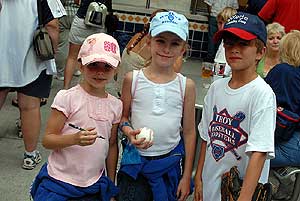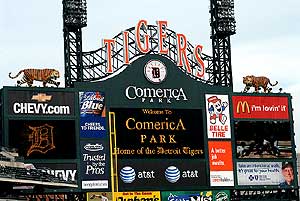Eat Em Up
Sure
this place is reeling with Tiger fever and the bandwagon’s never been
more full, but if a baseball team can get people seeing the city
differently, bring it on.
Why has the Tigers’ amazing run energized this city more than similar
successes by the Red Wings, Pistons and Shock? Maybe it is the 19-year
playoff drought, or perhaps it is the Tigers’ penchant of the to
satisfy this region’s deep thirst in times of great need. In 1968,
headlines proclaimed the Tigers a salve to the region’s deep riot burn.
Despite Bubba Helms’ best efforts, the 1984 World Series championship
gave beleaguered auto workers something to celebrate. In these days of
record unemployment, an unpopular war and faltering schools, the 2006
Tigers are doing it again.
But there’s also the fact that this
is baseball—not hockey or basketball. I remember the Bad Boys’
championships of the late 1980s quite well, but few memories compare to
breathlessly watching Sweet Lou, dreamy Lance Parrish, rapscallion Kirk
Gibson and the ever-authoritarian Sparky triumph mightily. I was only 8
years old, and I know just where I was sitting — in a family friend’s
basement — when the series was secured.
That year, my Polish
dance troupe performed on the field of Tiger Stadium, another indelible
memory. The next 15 years weren’t particularly baseball-ish for me. It
wasn’t until I moved to Corktown in 1999 that the baseball bug bit me
as an adult. That last season of Tiger Stadium was, in many ways, my
first.
 I would often walk the couple of blocks to the stadium
I would often walk the couple of blocks to the stadium
to purchase late-game $5 tickets that allowed you to sit anywhere you
pleased. I sat in just about every section that year, and will never
forget the hyper-green field that exploded upon your eyes when you
exited the concourse to your section.
When the boys moved
downtown, I followed. Sure, I thought baseball should remain at the
Corner, but you know what? It wasn’t my decision. And by then, I was a
fan. It grew every year — more games, more traditions, and more Tigers
buddies.
This was the first season I ever went in on season
tickets. Talk about good timing. I think the best thing about season
tickets is that you practically double your investment — almost
everyone you take to the game reciprocates, or at least buys the beer.
Whatever
the outcome of the World Series, this season has more than filled my
brain with baseball memories to last a lifetime. I was there when
Carlos Guillen’s bottom-of-the-ninth single averted a Yankees sweep in
early June. And the next day, when Rollercoaster Jones helped Boston
squeak out a win. I traveled to Chicago — my first visit to Wrigley
Field — to see the Tigs pound the Cubs. Hoping to see the division
clinching game, I sat through five of their last regular-season games,
all losses. And I witnessed Kenny Rogers reduce the mighty Yankees to
teeballers during the second home game of the league championship
series.
 I went Up North the following morning with plans to
I went Up North the following morning with plans to
find a bar that would be showing the game. I ended up at a small pub,
watching the game with a mostly older, non-tourist crowd. It proved to
be memorable, and not just because Detroit finished off New York.
Usually,
when I tell people Up North where I live, I get stereotypical responses
like “Aren’t you scared?” or “I haven’t been down there in years, and
don’t miss it one bit.” Whatever. But this time, with the memory of
Rogers’ sweet victory still fresh, I got, “Wow, that must be exciting!”
and rounds of beer, like I was part of the team or something. People
were telling me their Tigers memories, which spilled over into Detroit
memories — of the positive ilk. I gotta tell you, it was refreshing. If
it took a baseball game to do that, I’ll take it.
I guess I
finally figured out something British football hooligans perhaps take
all too much to heart: Sports can be more than just sports. Sports can
help heal a region’s wounds, and bring people together across lines of
race and class and geography. And for that, I say, “bless you, boys.”
Kelli B. Kavanaugh is Model D’s development news editor and likes Magglio Ordonez— with or without the long hair.
All Photographs Copyright Dave Krieger




